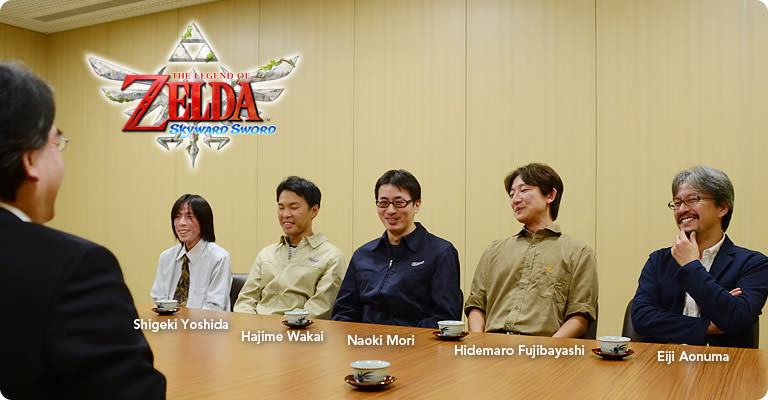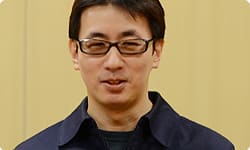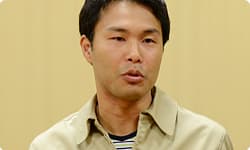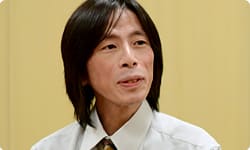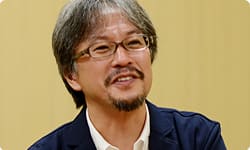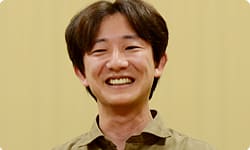A Battle Against Contradictions
This is our sixth time to discuss The Legend of Zelda: Skyward Sword in "Iwata Asks." I would like the three of you participating for the first time to introduce yourselves.
I'm Mori from the Software Planning & Development Division (SPD). I worked on the scripts for cinematic scenes and part of the direction and storyboards.
How long were you involved in this project?
About one year and three months.
That feels a little less than the full five-year development period, but that's because if you don't make the cinematic scenes once the structural framework of a Legend of Zelda game is determined, you'll have trouble later on.
Yes. The game contents change a lot, so while I only came in during the latter half of development, a lot happened.
I can imagine so. I'd like to explore that more later.
Okay.
I'm Wakai from the Entertainment Analysis & Development Division (EAD). I coordinated the overall sound and wrote some of the music myself. The first Legend of Zelda game that I worked on was The Legend of Zelda: The Wind Waker.1 This was my second Legend of Zelda game. 1. The Legend of Zelda™: The Wind Waker™: An action-adventure game released for the Nintendo GameCube™ system in March 2003.
Did you participate in this project from the very start?
No, not from the start, but since about three years ago.
Even so, that's quite a marathon.
Yes, it was.
I heard that in the end there was a total of ten sound staff members and it blew my mind! (laughs)
Yes. (laughs)
I'd like to ask about the "dense" sound later, too.
Okay.
I'm Yoshida from SPD. I was director of cinematic scenes.
Were you involved about as long as Mori-san?
Yes, that's right. But we were arranging the surrounding environment from early on, so I started a little sooner than he did.
The game required a lot of cinematic scenes, so you had to start by making a solid foundation and system.
Yes.
Shall we start with the script? How does the script get made?
First, I thought of a script that would roughly fit the framework of the game and proposed that to Aonuma-san, saying, "How about something like this?"
This time, the theme is the sword which makes use of the Wii MotionPlus2 accessory. When you think of a sword in The Legend of Zelda, you think of the Master Sword. Rather early on, we decided to address the origin of the Master Sword. 2. Wii MotionPlus™: An accessory with a gyro sensor that can connect to the Wii Remote™ controller.
That's right.
About that time, we began talking about how that would make this the first story in the series, and we wondered about involving the birth of Hyrule Kingdom. On the other hand, there was the setting of the floating island in the sky, and we thought, "How did that get there?"
Basically, it's there because Fujibayashi-san wanted to jump down from a high place!
Yes. (laughs) We settled on having the sky and surface world, and on top of that, it was going to tell the story of the creation of Hyrule, with the untold story of the origin of the Master Sword. So, looking back at the series so far, we began knitting together the various elements. And then all sorts of contradictions arose.
There have been a lot of games in the series since the original Legend of Zelda game 25 years ago and they each have their various stories and settings. Trying to create a new setting based on them all is bound to become a battle against contradictions.
Yes. Then about two years ago, we had to think about a number of things all at once—from the system to the stages and game fields—and Mori-san, Yoshida-san and the cinematic scene staff were beginning to join the team, so we were under pressure to make the hakogaki soon.
The hakogaki is a rough synopsis of the essential points of the script.
Yes. Time was running out, so I told everyone that I didn't feel well and holed up at home one whole day to write it! (laughs)
I can't condone such behavior, but you wanted to concentrate alone.
Yes. I locked myself in and from morning to evening did nothing but write the synopsis.
Even though you didn't feel well? (laughs)
Well, I suppose I didn't feel well, but I worked hard anyway! (laughs)
